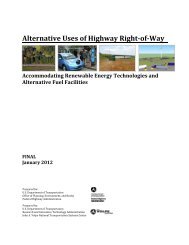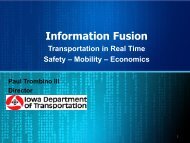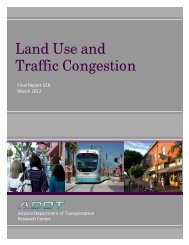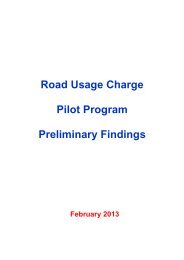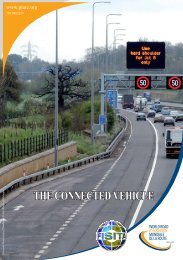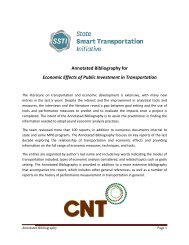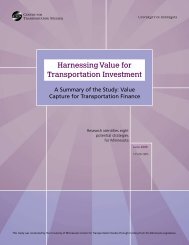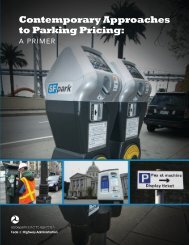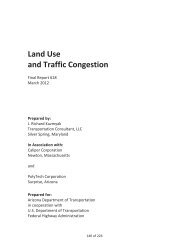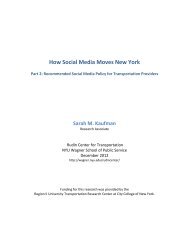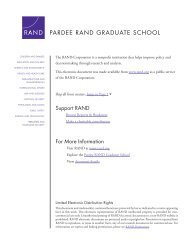Evaluating Alternative Operations Strategies to Improve Travel Time ...
Evaluating Alternative Operations Strategies to Improve Travel Time ...
Evaluating Alternative Operations Strategies to Improve Travel Time ...
Create successful ePaper yourself
Turn your PDF publications into a flip-book with our unique Google optimized e-Paper software.
SHRP 2 L11: Final Report<br />
using real-time traffic data from Atlanta and Seattle. The fundamental objective of project L03 was<br />
<strong>to</strong> develop predictive relationships between highway improvements and travel-time reliability. An<br />
overall finding from the LO3 research was that all forms of improvements, including capacity<br />
expansions, affect both average congestion and reliability in a positive way (i.e., average<br />
congestion is reduced and reliability is improved). The following are other key findings of the<br />
SHRP2 LO3 study:<br />
• Traditional capacity projects significantly improve reliability, not only capacity.<br />
• Demand management strategies such as congestion pricing will lead <strong>to</strong> improvements in<br />
reliability.<br />
• Accounting for traffic volume as a fac<strong>to</strong>r of available capacity can provide valuable input<br />
for efficiently allocating operations strategies, particularly incident management.<br />
The SHRP2 - LO3 study documents the fact that travel-time reliability is largely influenced by the<br />
degree <strong>to</strong> which recurring congestion occurs. That is, on a congested roadway segment, travel<br />
quickly becomes unreliable when nonrecurring events occur (such as incidents, inclement weather,<br />
crashes, or special events). Conversely, when a road segment is uncongested, travel time can often<br />
remain stable - even when nonrecurring events occur due <strong>to</strong> the ability of the roadway <strong>to</strong> "absorb"<br />
these events.<br />
CLASSIFICATION OF STRATEGIES AND TREATMENTS TO IMPROVE<br />
TRAVEL-TIME RELIABILITY<br />
This section introduces the organizational structure of strategies and treatments that can be applied<br />
<strong>to</strong> improve travel-time reliability. For the purposes of this report, the following definitions apply:<br />
• Strategy: A group of related activities that might include different ITS technologies,<br />
operational improvements, and management techniques that are aimed at achieving an<br />
improvement in travel-time reliability (e.g., improve incident response).<br />
• Treatment: A specific activity or action that i8mprove travel-time reliability (e.g., GPS<br />
technology <strong>to</strong> measure the variation in travel times). The application of one or more<br />
treatments composes a strategy.<br />
These strategies and treatments were identified through a literature review of other SHRP2<br />
projects listed as follows:<br />
•<br />
SHRP 2 L03: Analytic Procedures for Determining the Impacts of Reliability Mitigation<br />
<strong>Strategies</strong> (3)<br />
•<br />
SHRP 2 L06: Institutional Architectures <strong>to</strong> Advance Operational <strong>Strategies</strong> (4)<br />
• SHRP 2 L07: Evaluation of Cost-Effectiveness of Highway Design Features (5) , and<br />
•<br />
SHRP 2 C05: Understanding the Contribution of <strong>Operations</strong>, Technology, and Design <strong>to</strong><br />
(6, 7)<br />
Meeting Highway Capacity Needs<br />
Additionally, FHWA publications and international research documents were also reviewed. These<br />
sources are listed in the References portion at the end of this chapter.<br />
Classification of <strong>Strategies</strong><br />
Based on their general focus area, the strategies are grouped in<strong>to</strong> six major categories as follows:<br />
• Agency Management, Organization, and Resource Allocation<br />
• Information Collection and Dissemination<br />
• Vehicle Technologies<br />
• Incident and Special Event Management<br />
OPERATIONS STRATEGIES AND TREATMENTS TO IMPROVE TRAVEL-TIME RELIABILITY Page 63



